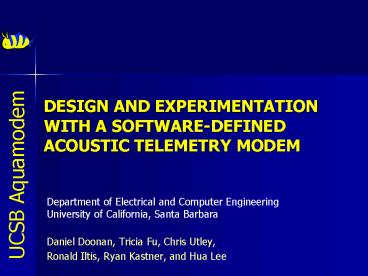DESIGN AND EXPERIMENTATION WITH A SOFTWARE-DEFINED ACOUSTIC TELEMETRY MODEM
1 / 29
Title: DESIGN AND EXPERIMENTATION WITH A SOFTWARE-DEFINED ACOUSTIC TELEMETRY MODEM
1
DESIGN AND EXPERIMENTATION WITH A
SOFTWARE-DEFINED ACOUSTIC TELEMETRY MODEM
Department of Electrical and Computer
Engineering University of California, Santa
Barbara
- Daniel Doonan, Tricia Fu, Chris Utley,
- Ronald Iltis, Ryan Kastner, and Hua Lee
2
Outline
- Motivation
- Summary of MP Algorithm and Aquamodem
Implementation - Direct Sequence vs. FSK
- Signaling Scheme
- Test Results wire, air, water
- Future work
3
UC Moorea
- Ecological applications
- Collaboration MCR Moorea Coral Reef LTER
4
Design Objectives
Target
Communication Range Communication Range 100 m
Operating Depth Operating Depth 20 m
Deployed Lifetime (without recharging) Deployed Lifetime (without recharging) 90 days
Allowable Multipath Spread Allowable Multipath Spread 10 ms
5
MP Algorithm
- Run this whole process for each possible symbol m
1, 2, , Ng. - Run subsystems for k 2, , Nf.
- Store residual norms at step k Nf.
- Minimize over the Ng residual norms to determine
symbol. - Store channel estimate fm for corresponding
symbol.
6
MP Algorithm
Return Channel Estimate Vector fest
To rk Cancellation Substem fest(qk)
7
MP Algorithm
Return Received Vector Residual Norm for a given
symbol.
8
Direct Sequence vs FSK
- Direct Sequence Spread Spectrum (DSSS) offers
frequency diversity gain over FSK in multipath. - Implicit coding gain, 1 of 8 waveforms
corresponds to a non-binary code. - MP allows online channel sounding while
communicating.
9
Signaling Scheme
- 8-ary code orthogonal modulation
Fadc 96 kHz
Fchip 6 kHz
Chip Filter Root-raised-cosine, 30 excess bandwidth
Fcenter 24 kHz
Gold Code Length 8 binary symbols gt 56 chip sequences
Symbol Duration 9.333 ms
Time guard interval 9.333 ms (usually)
Fsym 53.57 baud 54 symbols/sec
Fbit 160.71 bps 161 bits/sec
10
Hardware Implementation
11
Hardware Implementation
- Spectrum Digital board with TI C6713B DSP
- Onboard audio CODEC (A/D, D/A, etc.)
- Sonatech custom built transducers horizontal
omnidirectional coverage in 20 kHz 30 kHz range - Commercial single-chip class D power amp,
discrete matching network, automatic T/R switch,
LNA, and VGA. - Power supplies single 10V 25V rail from
battery, mostly switching, linear for analog.
12
Simulation
- Estimated MIP from simulations, with actual
number of multipaths 10 and SNR -4 dB. - Left 2 training symbols, SER 0.6645.
- Right 5 training symbols, SER 0.1023.
13
Wire Test Results
- of Multipaths Actual 1, Estimated 1-3
- Estimated Doppler Spread 0.06 Hz
- 0 SER, as expected in high SNR environment
14
Air Test in Lab Results
- of Multipaths Actual Unknown, Estimated 5-6
- Estimated Doppler Spread 0.104 Hz
15
Air Test in Hallway Setup
Earlier Tests Later Tests
Range 67.5 ft 117 ft
NF Fixed Estimated
training symbols 2 5
16
Air Test in Hallway Results
Trial SER Doppler Spread (Hz)
1 0.0233 0.173
2 0 0.1903
3 0 0.1557
17
Air Test in Stairway Setup
Clockwise, from top left Transmitter setup on
3rd floor, view from middle of 4th and 3rd floor
stairway, receiver setup on 4th floor.
18
Air Test in Stairway Results
Trial NF Guard time SER Doppler Spread (Hz)
1 20 9 0.0078 0.0069
2 20 11 0 0.0029
3 30 11 0.0078 0.0069
19
Tank Test at MSI Setup
20
Tank Test at MSINoisy Environment
21
Tank Test Series A Video
22
Tank Test Series AError Rates, Results
0.60 m range
12.7 m range
23
Tank Test Series ADoppler Spread
- Doppler Spectrum Plots, at 0.6 m distance and
12.7 m distance - Doppler Spread 0.2 Hz vs 0.9 Hz
24
Tank Test Series B
- 5 training symbols per sync, up from 2
- NF estimation code integrated
- Lower SNR due to Tx power amp problems (-1.0 dB
vs. 6.1 dB) - Only 0.60 m results collected
25
Tank Test Series B Results
- Series A 6.1 dB vs. Series B -1.0 dB SNR
- Note weak path at 5 ms not as apparent in Series
B MIP compared with Series A MIP.
26
Pool Test 10/20/2006
27
Pool Test 10/20/2006
28
Future Work
- Additional MSI Tank Tests Pool Tests
- Tests off the Goleta Pier (and other exotic
locales) - Improvements to timing acquisition
- Incorporate sparse Bayesian Kalman filter in the
modem.
29
Acknowledgments
- UC Santa Barbara Marine Science Institute
- Keck Foundation
- Navy
- Sonatech































